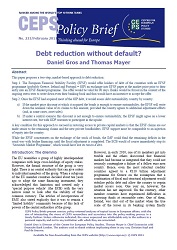№232. How to assess a rotating presidency of the Council under new Lisbon rules
№232. How to assess a rotating presidency of the Council under new Lisbon rules
The case of Hungary
Author(s): Piotr Maciej Kaczyński
Subject(s): Civil Society, Economic policy, Environmental and Energy policy, Government/Political systems, Inter-Ethnic Relations, EU-Approach / EU-Accession / EU-Development
Published by: CEPS Centre for European Policy Studies
Keywords: Lisbon rules; rotating presidency of the Council; Hungary; Council of the European Union; administrative capacity;
Summary/Abstract: On 1 January 2011, Hungary, the third member of the European Union to join the club in 2004, took overthe presidency of the Council of the European Union. This represents the first presidency of a newer member state under Lisbon Treaty rules. After the new treaty entered into force on 1 December 2009, all rotating presidencies are, in a sense, first time presidencies. Their relative success now depends more on administrative ability than political leadership.
Series: CEPS Policy Briefs
- Page Count: 4
- Publication Year: 2011
- Language: English
- Content File-PDF

